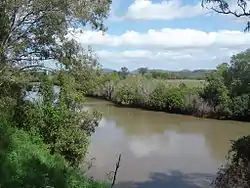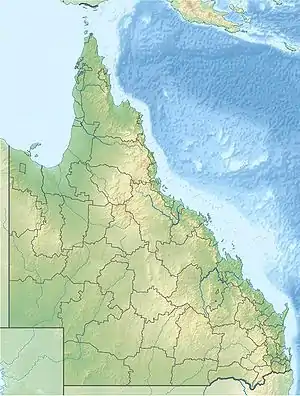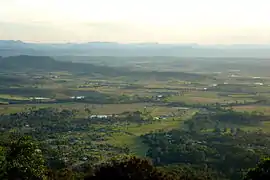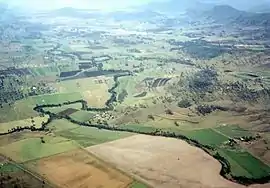Albert River (South East Queensland)
The Albert River is a perennial river located in the South East region of Queensland, Australia. Its catchment lies within the Gold Coast and Scenic Rim Region local government areas and covers an area of 782 square kilometres (302 sq mi). The river provides potable water for the town of Beaudesert.
| Albert | |
|---|---|
 Albert River at Stapylton, 2014 | |
 Location of Albert River river mouth in Queensland | |
| Etymology | Prince Albert of Saxe-Coburg and Gotha |
| Location | |
| Country | Australia |
| State | Queensland |
| Region | South East Queensland |
| Local government areas | Scenic Rim Region, City of Gold Coast |
| Physical characteristics | |
| Source | McPherson Range, Great Dividing Range |
| Source confluence | Right and Left Branches of the Albert River |
| • location | below Neglected Mountain |
| • coordinates | 28°12′44″S 153°2′36″E |
| • elevation | 184 m (604 ft) |
| Mouth | confluence with the Logan River |
• location | Alberton |
• coordinates | 27°41′42″S 153°14′30″E |
• elevation | 3 m (9.8 ft) |
| Length | 102 km (63 mi) |
| Basin size | 782 km2 (302 sq mi) |
| Basin features | |
| River system | Logan River |
| [1][2] | |
Course and features
Formed by the confluence of the Right and Left Branches of the river which begin in the Lamington National Park and drain the northern slopes of the Border Ranges within the Great Dividing Range, the Albert River rises below Neglected Mountain and east of the settlement of Hillview. The river flows generally north, joined by six minor tributaries before reaching its confluence with the Logan River between Alberton and Eagleby. From there the Logan flows a further 12 kilometres (7.5 mi) before entering Moreton Bay.[3] The Albert River catchment is bounded by the McPherson Range to the south, the Beechmont Range in the east and the Jinbroken Range and Birnam Range to the west.[4] The river's upper catchment is heavily influenced by the national parks of Tamborine, Main Range and the Lamington Plateau, and numerous local government-owned reserves and conservation areas,[5] that comprise part of the Shield Volcano Group of the UNESCO World Heritage Site Gondwana Rainforests of Australia.
Tributaries of the Albert River include the Stockyard Creek, Duck Creek, Kerry Creek, Cainbable Creek, Canungra Creek and Bidaddaba Creek.[1]
The Albert River is crossed by the Pacific Motorway, the Old Pacific Highway, and the Gold Coast railway line at Yatala.[1]
History
Yugembah (also known as Yugumbir, Jugambel, Jugambeir, Jugumbir, Jukam, Jukamba) is one of the Australian Aboriginal languages in areas that include the Albert River, Gold Coast, Logan, Scenic Rim, Beaudesert, Beenleigh, Coolangatta, Coomera, Logan River, Pimpama, Tamborine and Tweed River Valley, within the local government boundaries of the City of Gold Coast, City of Logan, Scenic Rim Regional Council and the Tweed River Valley.[6]
Mununjali (also known as Mananjahli, Manaldjahli and Manandjali) is a dialect of the Yugambeh language. The Mununjali language area includes landscape within the local government boundaries of the Scenic Rim and Beaudesert Shire Councils.[7]
The river was named by Robert Dixon[8] in honour of Prince Albert of Saxe-Coburg and Gotha.[9] Floods have been recorded on the Albert River in 1925, 1947, 1972, 1976, 1980, 1989 and 2017 (Cyclone Debbie).[10][11] In 1884, the S.S. Walrus ran aground on the bank of the river.[12] The vessel had been used as a floating sugar mill and distillery.
Proposed dam
In 1989, the Goss Government rejected a proposal to build Wolffdene Dam on the Albert River. Later, a dam near Glendower Homestead was once planned in a Queensland Government water strategy report from 1990. The option was discarded after it was revealed the site was too costly to build a dam for the amount of water it would have provided.[13]
Environmental concerns
The water quality of the Albert River remains in relatively good condition until it merges with the Logan River where the quality declines. Residential and industry development and land clearing in the catchment have deteriorated the water quality of the Albert River, particularly in its lower reaches. Key environmental issues that face the catchment are rapid population increase and development; altered flow patterns of the creek causing active erosion; deteriorating water quality; increased noise and vehicle movements; waste disposal; invasion of bushland by exotic plants and animals; management of the extractive industries; and day-to-day behaviour of residents and workers of the catchment.
Gallery
| Wikimedia Commons has media related to Albert River (Queensland). |
 View west over Wonglepong and the Albert River, 2010
View west over Wonglepong and the Albert River, 2010 The Albert River valley and farmlands, south east of Beaudesert. Cainbable Creek flows into the Albert River from the east.
The Albert River valley and farmlands, south east of Beaudesert. Cainbable Creek flows into the Albert River from the east.
References
- "Map of Albert River, QLD". Bonzle Digital Atlas of Australia. Retrieved 22 June 2015.
- "Logan River Catchment: Fact Sheet" (PDF). City of Logan. Retrieved 25 September 2015.
- "Rivers - Assessment of River Condition - Queensland:Logan-Albert Rivers". Australian Natural Resources Atlas. Department of the Environment, Water, Heritage and the Arts, Australian Government. Archived from the original on 15 March 2011. Retrieved 19 July 2010.
- "Water resources - Overview - Queensland - Surface Water Management Area: Albert River". Australian Natural Resources Atlas. Department of the Environment, Water, Heritage and the Arts, Australian Government. Archived from the original on 16 March 2011. Retrieved 19 July 2010.
- "Logan and Albert Rivers Catchments". Fact sheets. SEQ Catchments. Archived from the original on 13 March 2016. Retrieved 25 September 2015.
-
 This Wikipedia article incorporates CC-BY-4.0 licensed text from: "Yugembah". Queensland Aboriginal and Torres Strait Islander languages map. State Library of Queensland. Retrieved 28 January 2020.
This Wikipedia article incorporates CC-BY-4.0 licensed text from: "Yugembah". Queensland Aboriginal and Torres Strait Islander languages map. State Library of Queensland. Retrieved 28 January 2020.
-
 This Wikipedia article incorporates CC-BY-4.0 licensed text from: "Queensland Aboriginal and Torres Strait Islander languages map". State Library of Queensland. State Library of Queensland. Retrieved 30 January 2020.
This Wikipedia article incorporates CC-BY-4.0 licensed text from: "Queensland Aboriginal and Torres Strait Islander languages map". State Library of Queensland. State Library of Queensland. Retrieved 30 January 2020.
- Buchanan, Robyn. "Logan: Rich in History, Young in Spirit". p. 15. Retrieved 20 July 2012.
- "Southern Albert River Catchment". Gold Coast City Council. 20 February 2012. Archived from the original on 30 March 2012. Retrieved 20 July 2012.
- Carey, Jess (2009). "Known Floods in the Brisbane & Bremer River Basin, including the Cities of Brisbane and Ipswich". Bureau of Meteorology (Australia). Commonwealth of Australia. Retrieved 19 July 2010.
- "Cyclone Debbie: Evacuations in Gold Coast, Logan, Beenleigh amid record floods". ABC News. 31 March 2017. Retrieved 19 October 2018.
- "Beenleigh". Logan City Council. Retrieved 20 July 2012.
- Giles, Darrell. "Albert River dam site revealed". The Sunday Mail (Brisbane). Queensland Newspapers. Retrieved 19 July 2010.